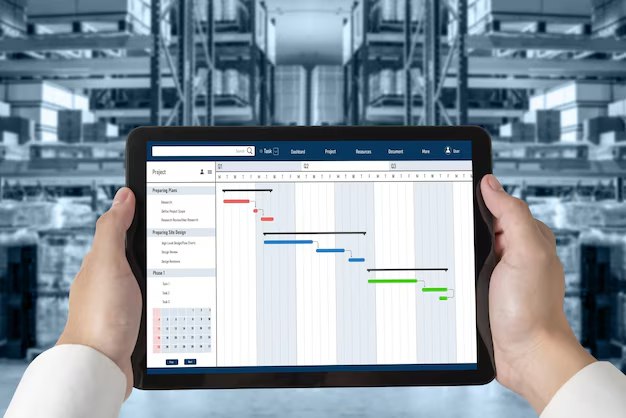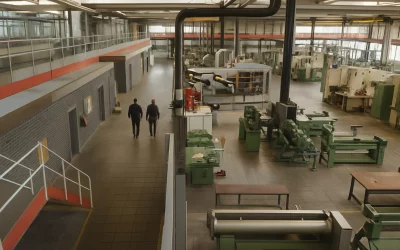In today’s competitive manufacturing landscape, efficiency and effectiveness are paramount. Production planning and scheduling (PPS) serve as the backbone of operations, ensuring that resources are utilized optimally, and products are delivered on time.
What is Manufacturing Production Scheduling?
Manufacturing production scheduling refers to the detailed planning of tasks, resources, and timelines to ensure that production processes are completed efficiently and on time. It is the process of deciding what will be produced, in what quantity, when, and by whom. Production scheduling is a vital part of scheduling in production planning and control, as it directly affects the overall efficiency of a manufacturing system.
View this post on Instagram
The objective of production scheduling is to balance resources, meet delivery deadlines, and optimize production capacity to avoid downtime and delays. With the aid of best production planning and scheduling software, manufacturers can dynamically adjust production schedules based on real-time data, ensuring flexibility in operations.
The Importance of Production Scheduling
Effective production scheduling is essential for
Meeting Customer Deadlines: Timely production helps meet delivery expectations.
Maximizing Resource Utilization: Ensures that machinery, labor, and materials are used efficiently.
Reducing Costs: Avoids unnecessary delays, overproduction, and underutilization of resources.
Improving Workflow Efficiency: Organizes tasks in the correct sequence, minimizing idle time and bottlenecks.
Types of Production Scheduling in Manufacturing
Different types of scheduling are used depending on the nature of the manufacturing process and the specific production requirements. Below are the key types
Flow Scheduling: Flow scheduling organizes tasks in a linear progression, where each task must be completed before moving to the next stage. It is commonly used in assembly lines and mass production environments where products are manufactured in large quantities.
Mass Production: Mass production involves producing large volumes of standardized products. Scheduling in mass production focuses on ensuring continuous production with minimal disruptions to maximize efficiency. Process Manufacturing: In process manufacturing, production is continuous, and products are often indistinguishable (such as chemicals or food products). Scheduling here ensures that production runs consistently to meet demand without excessive inventory buildup.
Batch Manufacturing: Batch manufacturing is the production of goods in batches rather than continuously. Scheduling batch production involves organizing production cycles for each batch to minimize downtime between runs.
Job Scheduling: Job scheduling is used in customized or small-scale production environments where products are made to specific customer requirements. This type of scheduling focuses on prioritizing and allocating resources for each unique job.
Factors to Consider When Creating a Production Schedule
Creating an effective production schedule requires considering several critical factors that ensure smooth production and optimal resource use
Production Planning: Production planning is the initial stage, where manufacturers outline what needs to be produced, the required quantities, and delivery timelines. This helps in aligning resources with customer demand and inventory levels.
Routing: Routing involves determining the path that materials and products will take through the manufacturing process. It ensures that resources are allocated efficiently and helps avoid unnecessary delays by optimizing material flow within the factory.
Scheduling: Scheduling is at the heart of production planning and control. It involves deciding when each task will be performed, which resources (machines, labor, etc.) will be used, and in what sequence. By using scheduling production planning and control techniques, manufacturers can ensure the optimal sequence of tasks and minimize idle time.
Execution: Execution is the final step where the production plan is carried out. Effective execution ensures that the schedule is followed as closely as possible, and any deviations are addressed quickly. This requires real-time monitoring and flexibility to adjust for unexpected changes such as machine breakdowns or supply chain disruptions.
The Role of Advanced Production Planning and Scheduling
 As manufacturing becomes more complex, traditional methods of production scheduling often fall short. This is where advanced production planning and scheduling systems come in. These systems utilize algorithms and data-driven insights to create dynamic, real-time schedules that adapt to changing production conditions. They help manufacturers optimize resource allocation, minimize production delays, and ensure that customer demands are met in a timely and cost-effective manner. With the use of best production planning and scheduling software, manufacturers can automate routine scheduling tasks, track progress in real time, and adjust schedules on the fly. These tools also enable better forecasting, which helps manufacturers prepare for fluctuations in demand, labor shortages, or supply chain disruptions.
As manufacturing becomes more complex, traditional methods of production scheduling often fall short. This is where advanced production planning and scheduling systems come in. These systems utilize algorithms and data-driven insights to create dynamic, real-time schedules that adapt to changing production conditions. They help manufacturers optimize resource allocation, minimize production delays, and ensure that customer demands are met in a timely and cost-effective manner. With the use of best production planning and scheduling software, manufacturers can automate routine scheduling tasks, track progress in real time, and adjust schedules on the fly. These tools also enable better forecasting, which helps manufacturers prepare for fluctuations in demand, labor shortages, or supply chain disruptions.
Conclusion
Production planning and scheduling are key components of successful manufacturing operations. From flow scheduling to job scheduling, manufacturers must choose the right scheduling strategy based on their production needs. By considering essential factors such as production planning, routing, and execution, and leveraging advanced production planning and scheduling tools, manufacturers can streamline their processes, reduce costs, and meet customer expectations more efficiently. At ThirdEye AI, we understand the importance of optimizing production processes through advanced technologies. Our solutions are designed to help manufacturers achieve seamless operations by integrating AI-powered scheduling and production control systems, ensuring better resource management and improved productivity.




